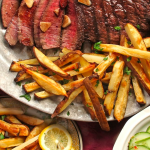Many people with rosacea have tried lots of different creams and treatments, but nothing seems to work.
One of the key benefits of the carnivore diet is healthier-looking skin. Skin health begins in the gut, and the carnivore diet eliminates all foods that trigger microbiome issues.
In this article, we’ll take a close look at rosacea, analyze the studies that connect rosacea to your diet, and see if the carnivore diet could be the solution you’ve been looking for.
TABLE OF CONTENTS
What is Rosacea?
Rosacea is a chronic inflammatory skin disease that manifests as redness and flushing of the skin, usually on the face.
It’s caused by pooling and dilatation of the blood vessels at the surface of the skin (telangiectasia), and causes hypersensitivity of facial skin. It can also form pus-filled vesicles or pustules, which is why it’s often confused with acne,
Approximately 15% of adults suffer from rosacea, and it affects more women than men. What causes rosacea is still not clear, but an overactive immune system is thought to be the critical problem. Hereditary and environmental factors alone or combined can also cause the disease.
What are the Risk Factors for Rosacea?
Common risk factors for the disease are:
- Sex — females are more at risk of getting the disease
- Sun exposure — the greater the sun exposure, the greater the incidence of the disease
- Past acne history — people with a long history of untreated acne are more susceptible
- Age — disease usually affects people of middle age
- Fair skin — people with fair skin and light hair are more at risk
- Family with Rosacea — the disease can run in families and can pass on to kids
Can Your Eating Habits Affect Rosacea?
Research has shown that rosacea is related to the gut microbiome (microorganisms residing in the gut), and that diet can affect the disease. Although there is no single diet that can prevent or lessen the adverse effects of the disease, there are a few nutrients that can be helpful for some symptoms.
In a clinical trial, people with rosacea were compared for intestinal disorders with the ordinary people. It was found that rosacea patients had a greater frequency of intestinal diseases (i.e., Celiac disease, Crohn’s disease, and ulcerative colitis).
This led to the assumption that gut bacteria can connect with the disease and foods that alter the composition of bacteria can also result in rosacea, and foods that are protective for bacteria can be protective for rosacea.
The Carnivore Diet and Rosacea
There is evidence that suggests that carnivore food can prevent rosacea. Various trials were held to assess the benefits of several foods for rosacea patients, and a few nutrients were found to be helpful for some of the symptoms.
Two of these nutrients were omega-3 fatty acids and zinc. The carnivore diet is a rich source of zinc and omega-3. A vegetarian or high-carb diet can never fulfill your requirement for zinc and omega-3.
High carb diets induce inflammation that often results in cystic acne on the face with pus-filled bumps. Eliminating inflammation and oxidative stress from the body should be the main aim of any diet fighting rosacea. The carnivore diet fits this definition.
Zinc
Zinc is one of the elements that can be used to treat skin problems. It has the special feature of inhibiting the growth of bacteria in the sebaceous glands. If taken orally, it can prevent pimples and cyst formation. Various skin ointments for acne and rosacea contain zinc sulfate.
Red meat is a good source of zinc — and red meat is a key feature of the carnivore diet.
Vitamin C
Vitamin C helps in managing Rosacea. It helps crosslink collagen (which is part of the blood vessels and thus strengthens them). Strong and healthy blood vessels don’t bleed, and flushing can be prevented.
Liver and seafood can be good sources of vitamin C. Eating organ meats and shellfish is key to any ancestral diet.
Niacinamide
Niacinamide has anti-inflammatory effects and can be used to prevent redness and flushing. It’s hands-down the best nutrient for your skin.
It is found in meat, eggs, fish, and dairy products — all carnivore staples.
Omega-3 fatty acids
Omega-3 fatty acids are essential fatty acids needed by the body. These are one of the best anti-inflammatory agents. These are believed to reduce inflammation in rosacea. Rosacea patients widely use fish oil because it contains many Omega 3 fatty acids.
Even better than using fish oil is eating a carnivore diet that contains lots of natural fish.
Conclusion
Although there have been no specific studies into the carnivore diet and rosacea, existing research shows that rosacea begins in the gut and that the right diet can treat it.
All the foods that science shows can help rosacea are included in the carnivore diet. Plus, the carnivore diet also eliminates inflammation and oxidative stress, helping you heal from rosacea and many other health issues.
Read more about how the carnivore diet can also help other health conditions:
- Carnivore diet and arthritis
- Carnivore diet and erectile dysfunction
- Carnivore diet and hair loss
- Carnivore diet for IBS
- Carnivore diet and inflammation
- Carnivore diet and insomnia
- Carnivore diet and kidney stones
- Carnivore diet and menopause
- Carnivore diet and multiple sclerosis
- Carnivore diet for psoriasis
- Carnivore diet for SIBO









Leave a Reply